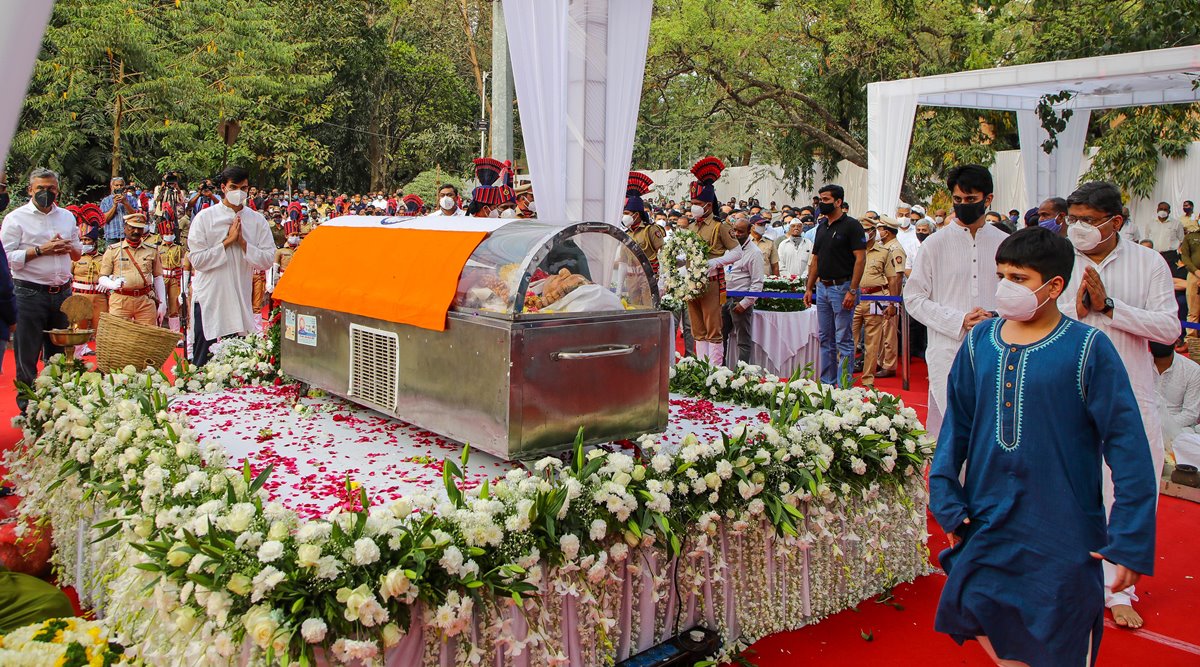February 14, 2022 4:48:32 am
 People pay their respects to Bajaj in Pune, Sunday. (Express Photo by Ashish Kale)
People pay their respects to Bajaj in Pune, Sunday. (Express Photo by Ashish Kale) Since the early hours of Sunday, all roads in the industrial city of Pimpri-Chinchwad seemed to lead to one destination — the Bajaj Auto plant at Akurdi area. It was here that Rahul Bajaj’s body was laid for people to pay their respects.
And they all came. Industrialists and workers. Politicians and commoners. Many remembered a man with the conviction to take on the powers that be. Others talked of a boss who always felt like an ‘aapla manoos’ (our man).
At 5.30 pm, the titan of Indian industry was cremated with full state honours in Pune. His sons, Rajiv and Sanjiv Bajaj, performed the last rites.
The chairman emeritus of Bajaj Auto, who was ailing for some time, had died on Saturday afternoon at 83.
Maharashtra Home Minister Dilip Walse Patil laid a wreath on his body on behalf of the government.
Earlier, at the company plant in Akurdi, NCP chief Sharad Pawar and state cabinet ministers Aditya Thackeray and Chhagan Bhujbal were among those who paid tribute.
The city of Pimpri-Chinchwad wore a sombre look as all public functions stood cancelled without a state fiat. It was understandable. The Bajajs had set up shop in the 1960s when only a handful of industrial units were present in the Pimpri-Chinchwad-Bhosari industrial belt. By the 1990s, the figure had jumped to 10,000 small, medium and big industrial units in the city, drawing job hopefuls from across the state and even the country.
The company had effectively transformed the city, and at the centre of this transformation was the Akurdi plant.
Here, the queue of those waiting to pay their last respects felt unending. Even those who could not walk due to age made it to the plant with help from kin. Every mourner, it seemed, had a deep sense of attachment to Bajaj. Even after paying their last respects, they stayed back, recalling their days in the company of their boss. Two veterans were seen hugging each other, their eyes welled up. Some of those who spoke to this paper narrated the Rahul Bajaj era with a sense of pride and belonging.
“I joined the company as a fitter in 1969 and retired after 30 years of service. In all the three decades that I worked with Bajaj Auto, I never felt like I lived elsewhere. The company premises were like my own home, my family,” said Subash Bodhe, 75, who walked in with the help of a stick and was supported by his grandson.
Bodhe said he started as a worker and retired as a union leader. “Be it as a worker or a leader, Rahul Bajaj was always accessible to us. We have had several conversations with him. I used to think he was a big man and would not be interested in talking to me. But that was never the case. He was an “apla manoos” (our man)… We were an integral part of the Bajaj family,” Bodhe said, his voice quivering.
Raosaheb Kalonji, a worker who retired after 30 years of service, said Bajaj would regularly seek feedback and advice from them in a bid to improve the quality of the products and step up production. “‘Kay bolta bol… kya kar sakte hai… Kuch idea do yaar’. This is how he would talk to us whenever he made a surprise visit in the shop area,” recalled Kalonji. “He made the workers feel part of the Bajaj family. And that exactly was the reason why every worker put in his might to churn out over 1,000 vehicles a day. It was made possible because the company and Rahul Bajaj cared for and respected us.”
Besides his rapport with the ordinary company workers, Bajaj had become a “hero” for them as his company never delayed their payments. “No matter what phase the company was going through, we always got our salaries on time,” said Harun Haveli, 77, a retired worker. “Bajaj was probably the only company that ensured that its workers and family did not suffer on account of delayed salaries. In my 30 years of service, I don’t remember the company ever delaying our salary for a month.”
The canteen at the plant provides tea and biscuits, breakfast and a vegetarian meal — all for a princely sum of Re one. “The canteen has been running for 50 years. Initially, an employee got a full plate meal for 50 paise. Later, the amount was raised to Re one. Every worker used to pay Rs 27 every month which was cut from his salary. And the meal has a feel of the one made at home,” said Sanjay Joshi, president of the Vishwakalyan Kamgar Sanghatana at the Akurdi plant.
Joshi said after the scooter production was stopped and the company ran into trouble, Bajaj Auto had started laying off workers. “As many as 2,000 workers were laid off. We protested for nearly two months. After the intervention of NCP chief Sharad Pawar, we were all taken back. After joining, Rahul Bajaj did not hold any grudge against us. In fact, we were like back in the family fold from day 1. Later on, we were offered VRS. The company offered us Rs 6 lakh and a monthly salary of Rs 10,000 for 10 years without coming to work. Those in their 50s readily accepted the offer,” said Joshi.
- The Indian Express website has been rated GREEN for its credibility and trustworthiness by Newsguard, a global service that rates news sources for their journalistic standards.

